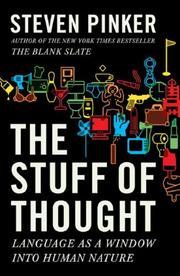Metaphor in Science
Metaphor in science, Boyd suggests, is a version of the everyday process in which a metaphor is pressed into service to fill gaps in a language’s vocabulary, like rabbit ears to refer to the antennas that used to sprout from the tops of television sets. Scientists constantly discover new entities that lack an English name, so they often tap a metaphor to supply the needed label: selection in evolution, kettle pond in geology, linkage in genetics, and so on. But they aren’t shackled by the content of the metaphor, because the word in its new scientific sense is distinct from the word in the vernacular (a kind of polysemy). As scientists come to understand the target phenomenon in greater depth and detail, they highlight the aspects of the metaphor that ought to be taken seriously and pare away the aspects that should be ignored, just as Dawkins did in the heater-cooler analogy. The metaphor evolves into a technical term for an abstract concept that subsumes both the target phenomenon and the source phenomenon. It’s an instance of something that every philosopher of science knows about scientific language and that most laypeople misunderstand: scientists don’t “carefully define their terms” before beginning an investigation. Instead they use words loosely to point to a phenomenon in the world, and the meanings of the words gradually become more precise as the scientists come to understand the phenomenon more thoroughly.
This still leaves open the question of why metaphors should ever work. Why should so many scientific analogies allow us to reason to correct conclusions, as opposed to being mere labels, like quark or Big Bang, that are memorable but uninformative? Boyd suggests that scientific metaphors are often dispensable for things that may be characterized by a single trait or essence, like water being H2O. But they come into their own for complex systems composed of numerous parts and properties that work in concert to keep the system stable (he calls them homeostatic property cluster kinds). The basic idea is that there are overarching laws of complex systems that govern diverse phenomena in the natural world.48 One set of laws explains why solar systems, atoms, planets with their moons, and balls tethered to poles fall into stable patterns of revolution. Another explains similarities in ecosystems, bodies, and economies: in all three systems, for example, energy is taken in, internal functions differentiate, and resources get recycled. A third explains the feedback loops by which animals regulate their blood glucose, thermostats regulate house temperature, and a cruise-control device regulates the speed of a car. To the extent that these laws exist, scientists can discover their properties as they study the systems that are governed by them. And they are entitled to use a metaphor both as a label for that kind of system and as a means of generalizing from a well-understood exemplar to a less-well-understood one.
In the day-to-day conduct of science, all this leaves room for debate about whether a phenomenon really is an example of the system named by its metaphorical label, or whether the resemblance stops at the metaphorical terminology. No one has a problem with the idea that the lens of an eye and the lens of a telescope are two instances of the general category “lens,” rather than the telescope being a “metaphor” for the eye. Nor is there anything metaphorical going on when we refer to “the genetic code”: a code by now is an information-theoretic term for a mapping scheme, and it subsumes cryptograms and DNA as special cases. But do cognitive psychologists use the computer as a “metaphor” for the mind, or (as I believe) can it be said that the mind literally engages in computation, and that the human mind and commercial digital computers are two exemplars of the category “computational system”?
Notes:
Folksonomies: science metaphor communication
Taxonomies:
/science (0.449542)
/science/social science/linguistics/translation (0.333900)
/law, govt and politics (0.286280)
Keywords:
metaphor (0.967735 (negative:-0.016723)), Science Metaphor (0.785471 (negative:-0.510256)), target phenomenon (0.782566 (negative:-0.402961)), new scientific sense (0.714413 (neutral:0.000000)), homeostatic property cluster (0.703717 (neutral:0.000000)), commercial digital computers (0.681089 (neutral:0.000000)), complex systems (0.674742 (positive:0.290048)), source phenomenon (0.633156 (negative:-0.402961)), television sets (0.588365 (neutral:0.000000)), rabbit ears (0.584013 (neutral:0.000000)), kettle pond (0.583547 (neutral:0.000000)), everyday process (0.583335 (negative:-0.343181)), metaphorical label (0.581258 (positive:0.357531)), new entities (0.580162 (negative:-0.468782)), metaphorical terminology (0.577853 (neutral:0.000000)), heater-cooler analogy (0.577141 (negative:-0.605663)), scientific metaphors (0.574812 (negative:-0.394092)), scientific analogies (0.572309 (negative:-0.565749)), scientists (0.571181 (positive:0.123666)), mere labels (0.569034 (negative:-0.472422)), scientific language (0.568965 (neutral:0.000000)), technical term (0.568857 (negative:-0.402961)), greater depth (0.568033 (neutral:0.000000)), single trait (0.567437 (negative:-0.394092)), solar systems (0.565311 (positive:0.284634)), Big Bang (0.564362 (neutral:0.000000)), abstract concept (0.564327 (negative:-0.402961)), information-theoretic term (0.563014 (neutral:0.000000)), numerous parts (0.562239 (positive:0.295462)), well-understood exemplar (0.560745 (positive:0.413612))
Entities:
solar systems:FieldTerminology (0.677451 (positive:0.337810)), Boyd:Person (0.624325 (negative:-0.394092)), kettle pond:GeographicFeature (0.537828 (neutral:0.000000)), quark:Company (0.454556 (neutral:0.000000)), Dawkins:Person (0.453832 (negative:-0.605663)), blood glucose:FieldTerminology (0.434102 (negative:-0.276270))
Concepts:
Analogy (0.946937): dbpedia | freebase
Metaphor (0.789801): dbpedia | freebase | opencyc
Mind (0.706367): dbpedia | freebase | opencyc
Metonymy (0.649284): dbpedia | freebase
Conceptual metaphor (0.639517): dbpedia | freebase | yago
Simile (0.624243): dbpedia | freebase
Language (0.609049): dbpedia | freebase | opencyc
MIND (0.602838): geo | yago






